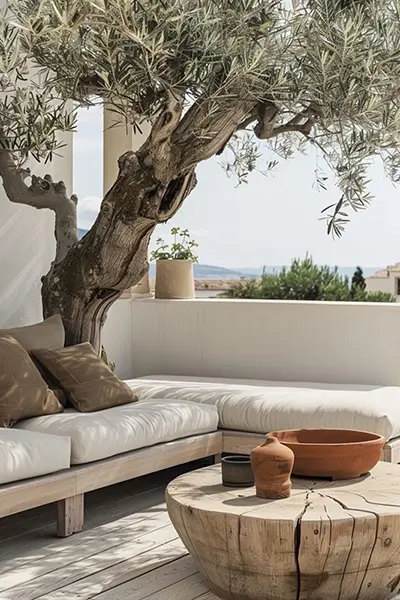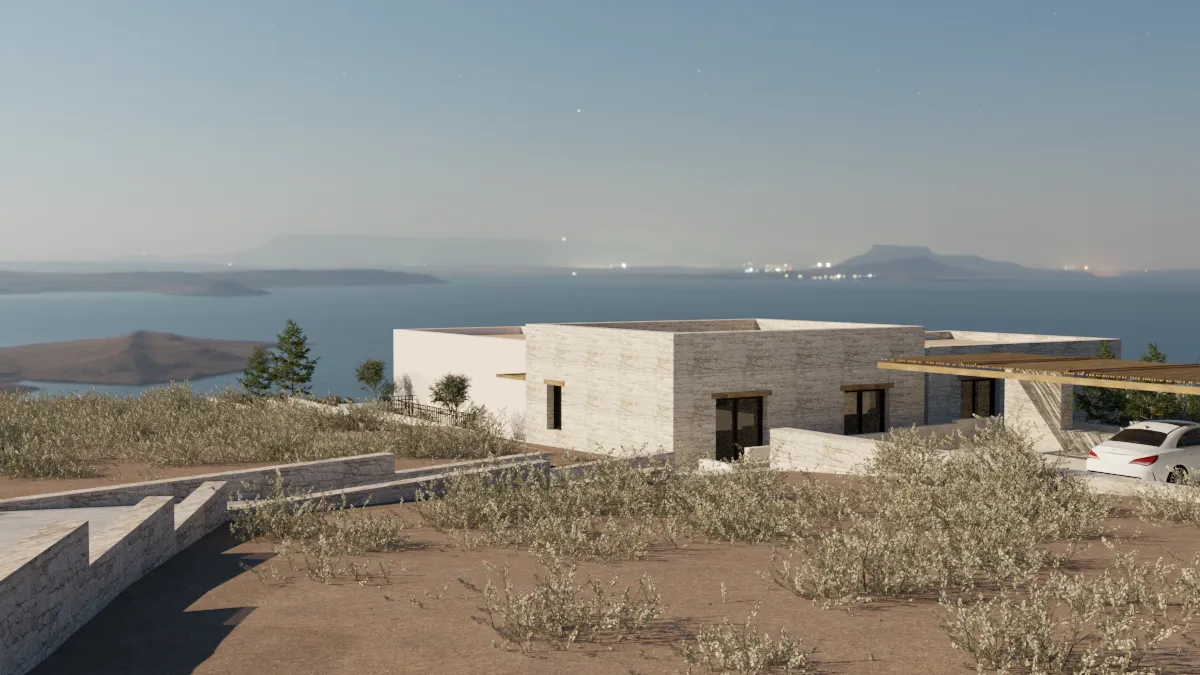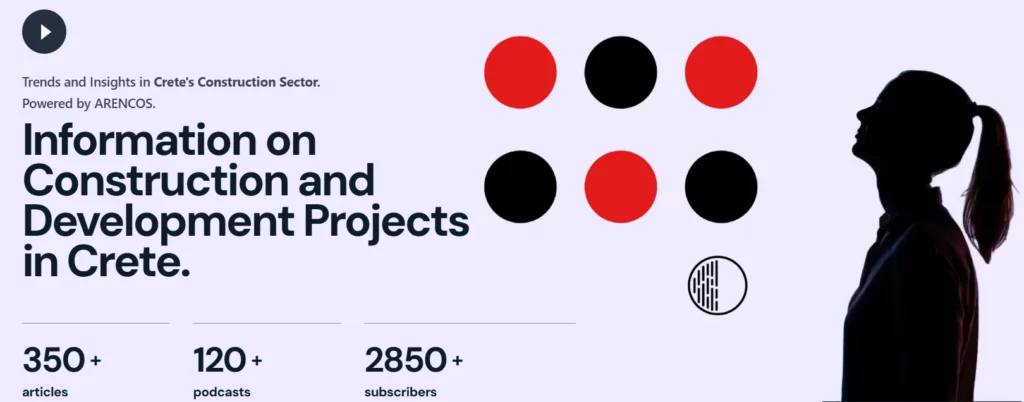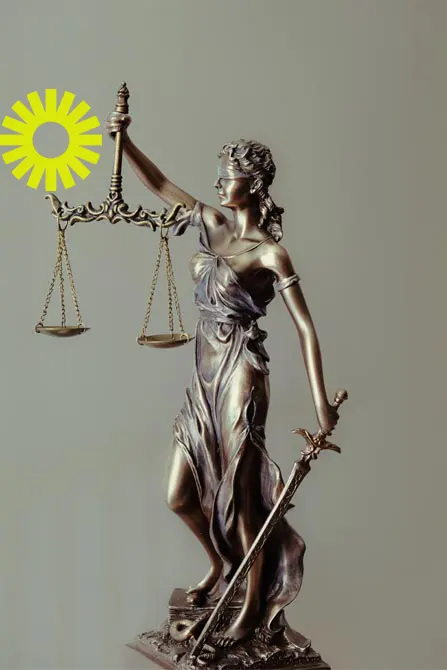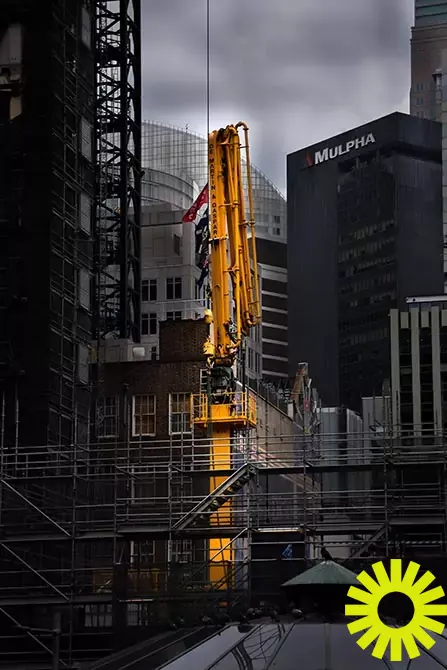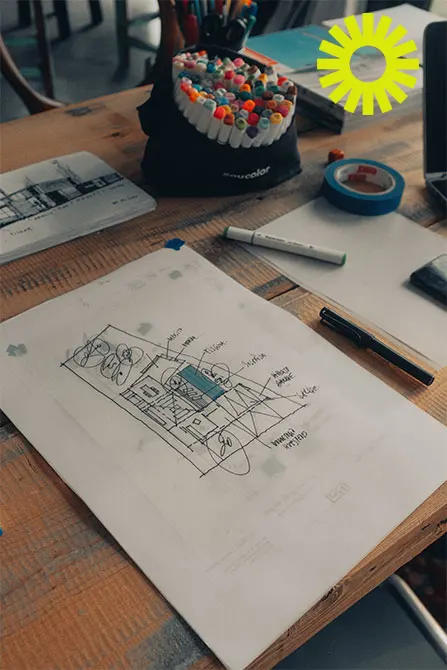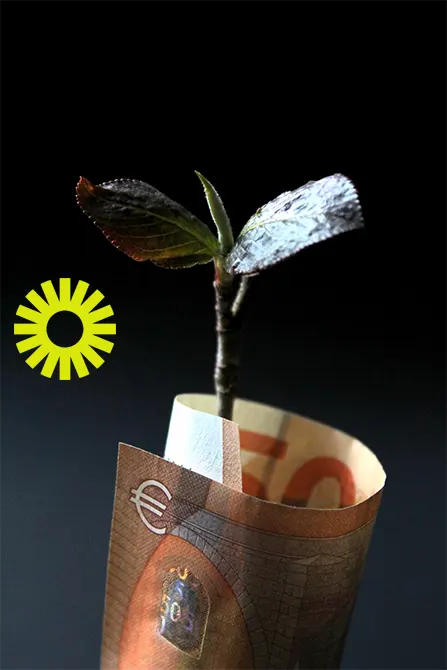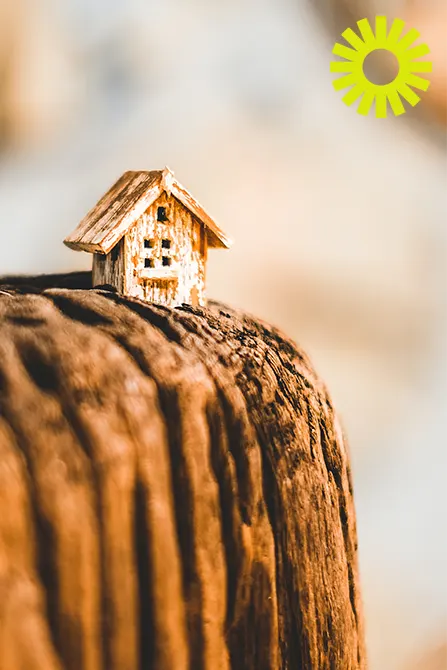Building a House in Crete: The Initial Steps
Building a new house in Crete, Greece can be a very rewarding experience and needn’t be difficult, complex, or confusing. Most people struggle with their first new build project because they are uncertain of the process, so we have developed this guide to let you know what you can expect during the process of building with ARENCOS.
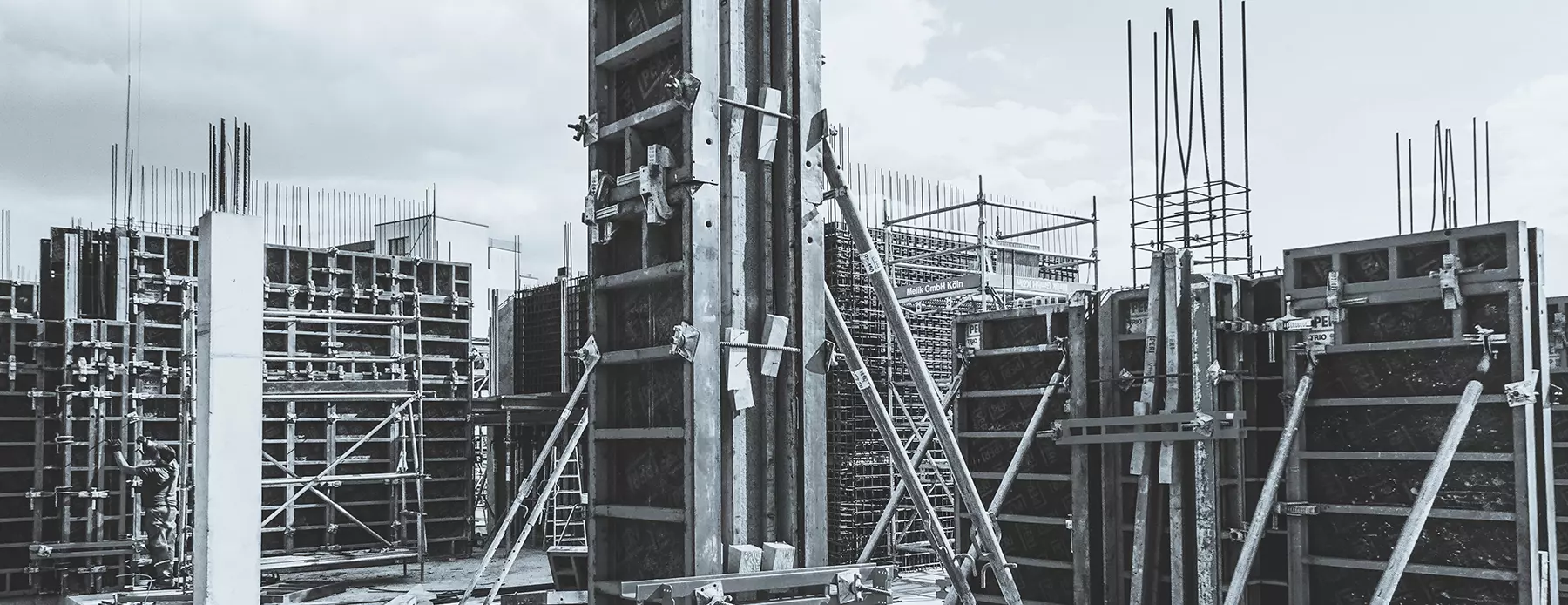
Building a House in Crete
Critical Considerations
You don’t need to know exactly what you want before meeting with builders or your constructor. The first thing a builder or a constructor will ask you is, “What are you thinking? What style do you like? One level or two? Walk-out basement? Swimming pool? An attached garage?”
However, the process of building a new house in Crete, Greece long before the foundation is poured. The construction process performance, time, and effectiveness should be much more efficient and exciting if you first develop a consistent and reliable project management plan and find an honest, experienced and trustworthy builder or construction company.
You’re thinking to build a new house in Crete, Greece. Which do you do first, select a real estate agent or select an architect?
Both approaches have merit. If you know everything about the area, a consultation from a real estate agent may not make sense for you. Having an idea of the architectural style you prefer will determine the size, location and characteristics of your building site.
Ultimately, the key to a successful home-building journey in Crete lies in preparation, collaboration, and informed decision-making. Take the time to define your priorities—whether they are location, sustainability, architectural design, or long-term investment potential.
Surround yourself with professionals who understand both the local terrain and your vision. From selecting the right plot and architectural concept to managing timelines and legal obligations, each step plays a critical role in transforming your idea into a durable, high-quality home that enhances your lifestyle and adds value to your future.
Before you even select your construction firm to see what we do, you should have an accurate and holistic idea of whether you can afford to build a house in Crete and how much you really want to be involved in the building process.
Moreover, it is very important to select a professional in the real estate market of Crete to help you in your property search and facilitate your decision-making in a transparent and ethical way.
Not all vacant land in Crete, Greece is the same. From waterfront land to large plots near the major cities of Crete, there are many critical parameters to consider. Land acquisition is full of risk and can be a convoluted process laden with bureaucratic complexities.
At ARENCOS we see the process of acquiring land in Crete as much an art form as it is a science.
Through the lessons learned from the past, a commercial real estate transaction is completely different from the acquisition of land for residential use, and thus follows a much different method for success.
Table: Land Types and Considerations in Crete
| Land Type | Description | Key Considerations |
|---|---|---|
| Waterfront Plots | Close to sea or beaches | Often protected; may have strict coastal zone laws |
| Rural Inland Plots | In villages or olive groves | May lack infrastructure; check topography & access |
| Urban/Peri-Urban Land | Near or within city boundaries (Chania, Heraklion) | Higher price; better utility access and buildability |
| Agricultural Land | Outside town planning zones | Limited or no building rights without conditions |
Navigating Land Acquisition in Crete: Art & Strategy
At ARENCOS, we approach land acquisition in Crete as both an analytical and creative endeavor. It requires a deep understanding of:
- Regulatory complexity: Zoning laws, forestry designations, protected heritage zones
- Commercial vs Residential use: The acquisition strategy and legal process differ significantly
- Hidden risks: Disputes over ownership, access limitations, or pending public works
Having the right due diligence procedures—and the right team—is key to safeguarding your investment and ensuring your project gets off to the right start.
From Elounda to Zakros and from Loutro to Palaiochora Crete’s regions are very diversified and they can offer spectacular real estate opportunities for the potential buyer or investors.
You can decide if you want to live by the sea, in the countryside, or in the mountains. You can even decide if the Aegean or the Lybean Sea would be your everyday view from your balcony.
There are many different types of properties to choose from at various prices: from newly built apartments and maisonettes in Chania, Heraklion, Rethymnon, and Agios Nikolaos to luxurious villas, family homes, and tourism facilities – commercial properties.
Depending on the type of lifestyle you are looking for, some of the best places to invest in real estate in Crete are Chania Old Town and modern city, the spectacular district of Apokoronas with its wonderful villages such as Almirida, Vrisses, Plaka, Kalives, Georgioupolis, Vamos, Kournas and Kokkino Chorio.
Once your decision about the real estate partner – who will suggest the most ideal and hassle-free property to you – has been undertaken, you need to visit the area of your interest and realize what the site and neighbourhood look like.
It is also strongly recommended to explore the entire area to discover more alternatives, if any, that may also satisfy your needs and budget.
Rimmed by more than 1,000 kilometres of coastline, and with spectacular beaches backed by impressive mountains and gorges, Crete is unlike any other place on Earth. Living in Chania Guide from ARENCORES is a piece of very useful information to discover the area.
Key Considerations During Land Selection
- Legal Status Check: Confirm clear title ownership, no outstanding mortgages, and no boundary disputes.
- Buildability Confirmation: Does the land meet size, frontage, and location requirements for a residential permit?
- Utilities Access: Is there nearby water, electricity, sewage, or will off-grid solutions be needed?
- Environmental & Archaeological Restrictions: Especially relevant in rural or coastal areas.

Leading Sustainable Development
Building a House in Crete - Financing
3.0 Your Financing Options
Crete has become a popular destination for private property purchases, investments and even immigration, especially among West-European pensioners seeking inexpensive, yet safe and high standards of living.
The recession in the Greek real estate market since the recent economic crisis has made those opportunities even more reasonable and potentially lucrative.
Once you’ve decided that building a house in Crete is the right choice for you, the next step is figuring out how you’ll pay for all the expenses. Unless you can pay for the entire project with cash, you’ll likely be looking for a construction loan/ mortgage.
Getting a construction loan is often more complicated than getting a mortgage for a real estate purchase, as you’re borrowing money for a theoretical-hypothetical concept and not a physical house.
You’ll need to provide your lender with a proficient timetable, reliable budget, floor plans, materials and equipment needed and extensive details to be considered. Other things to know:
- Usually, construction loans have variable rates that are often higher than typical mortgage rates.
- A 20%-30% down payment is usually required.
- The loan can include the land you’re purchasing or it can cover only the construction costs if you already own the land.
Available for real estate assets purchases, renovation works and new construction projects
- Loans are available in Euros only.
- Available on a Capital & Interest repayment basis
- The maximum loan to value for a purchase is 70%.
- The maximum term is 25 years – available to age 75.
- The minimum loan amount is €25,000
All schemes require full documentary evidence of income – and a personal Tax Identification Number (TIN).

Building a House in Crete - ROI Potential
4.0 Is it Worth Buying a Property in Crete?
It is absolutely worth buying property in Crete for several reasons. Not only because of the opportunities Crete has to offer itself, the outstanding quality of life and affordable cost of living, but also of its exceptional investment returns and the opportunity to get residency in one of the most wonderful countries in the world.
The property market in Crete is white-hot—and neither the COVID-19 nor rising property prices can put out the flames. According to our research property purchases have steadily increased year-over-year since June 2018 as real estate assets continue to get more expensive across the country.
However, investing in real estate is a terrific idea if you are in it for the long haul, not a quick return.
Especially if you are a first-time buyer, your best bet is investing in residential properties near the popular tourist resorts or the big cities such as Chania, Heraklion Rethymnon, and Agios Nikolaos that produce rental income year-round.
Just make sure you understand all of the associated legal fees and are prepared for unexpected costs.
Is Buying a Property in Crete a Good Investment?
We asked 45 property purchasers. Here’s what they said.
Building House in Crete - Restrictions
5.O What are the Restrictions & Property Rights in Greece?
The right to property, as a fundamental right, is under the protection of the State, as provided in the Greek Constitution, Article 17, whereas it is stipulated that property rights cannot be exercised against the public interest.
Within this context, the Constitution imposes a restriction or deprivation of property (expropriation) for the sake of public interest, always under the prerequisite of a prior compensation of the owner.
Furthermore, the most significant source of property law lies in the third book of the Civil Code (articles 947-1345). Other provisions and property law rules exist in other books of the Civil Code, and the Code of Civil Procedure, as well as in various special laws.
The Rights in Real Estate
Real estate property rights, i.e. rights that provide to the beneficiary direct and absolute power, are the ownership (article of C.C 999), the servitudes (articles of C.C 1118), and the mortgage (article of C.C 1257). Furthermore, the following distinctions are also met:
– the full ownership, which constitutes a universal real right. It may be absolute (100% ownership of the property) or joint ownership (ownership belonging to two or more persons, i.e. the joint owners).
– the bare ownership, which is a limited real estate right and constitutes a part of full ownership, as the bare owner lacks the advantages of the usufruct, which means he cannot use or exploit his property. Usufruct, if not otherwise determined, is inactivated when the usufructuary dies.
Following the death or resignation of the usufructuary, the usufruct is unified with bare ownership and the bare owner becomes full owner of the property.
Whether you're planning to build your dream home, explore real estate opportunities, or understand local regulations, this section offers curated insights, FAQs, step-by-step guides, and tools to support confident and informed decision-making. Backed by years of hands-on experience and in-depth research, our resources are designed to help you navigate every stage of your project with clarity and peace of mind.
Property law in Greece is governed by a comprehensive legal framework that regulates the ownership, use, and transfer of real estate. Key aspects include the registration of property transactions in the Hellenic Cadastre, adherence to zoning laws and building regulations, and the distinction between private and public property rights.
Building a House in Crete - Land Asking Prices
What’s the Approximate Cost of Land Plot Properties in Crete?
The cost of property in Crete is influenced by several key factors, including the type of property, its specific features and benefits (i.e., its value proposition), prevailing market conditions, and the dynamics of supply and demand. Additionally, recent sales of comparable properties—similar in condition, location, and size—play a significant role in determining pricing.
The following table provides a general overview of typical property prices across various regions of Crete, offering insight into how location and property characteristics can affect overall costs.
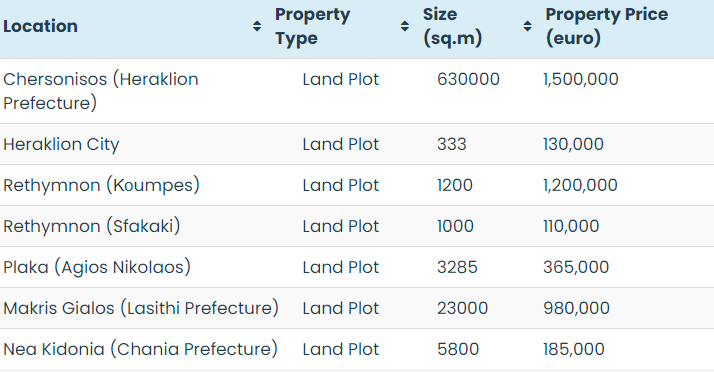
Key Early Steps and Realistic Cost Expectations
Building a house in Crete is a complex but highly rewarding process, especially for those seeking a personalised, energy-efficient residence in a Mediterranean setting. The journey begins with securing a suitable plot of land, and prices can vary widely based on location and proximity to the coast or urban centers.
In prime areas such as Elounda, Agios Nikolaos, or the north coast of Chania, land prices can range from €300 to €700 per square meter, while in more remote or less developed inland regions, prices may still start around €60–€100 per square meter.
Once land is acquired, essential first steps include a detailed topographic survey and thorough legal due diligence to verify buildability and confirm compliance with Greek zoning laws. For out-of-plan areas, the minimum land requirement is typically 4,000 m² unless specific grandfathering clauses apply. Following this, you’ll need to engage an architect or engineering consultancy to develop the design and handle the building permit process—this stage can take anywhere from 4 to 9 months, depending on project complexity and the responsiveness of public authorities.
At the same time, setting a realistic financial framework is crucial. The cost of building a modern, high-quality home in Crete now typically ranges from €1,800 to €2,800 per square meter, while luxury villas or passive houses with advanced energy systems, smart technology, and biophilic features can exceed €3,200 per square meter.
Additional costs such as IKA (social security contributions), utility connections, project management, and unexpected delays must also be factored in. Engaging experienced professionals early on helps navigate bureaucracy, control costs, and ensure that your investment is aligned with local regulations and your long-term goals.
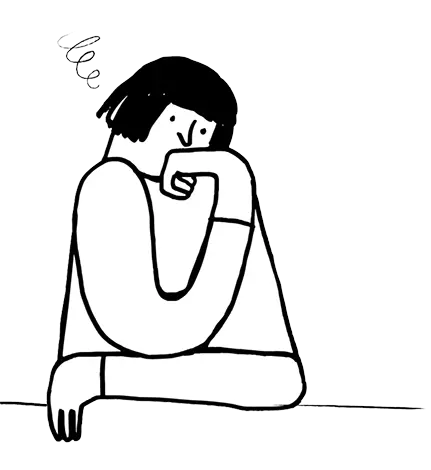
Disclaimer: The information presented in this article is intended for general guidance only and should not be considered legal, financial, or professional construction advice. Property values, building costs, regulations, and permit timelines in Crete are subject to change and may vary based on location, project scope, and evolving legal frameworks.
Data Note: All data and estimates are based on ARENCOS’ internal research, local market observations, and past project experience as of 2025. Due to ongoing market fluctuations, regional disparities, and regulatory updates, readers are encouraged to consult a licensed local expert before making any decisions.
Once you have discovered a promising building site for your new house in Crete, spend some time on the site. See the boundaries of the plot, smell the flowers, feel the atmosphere, hear the sounds and walk the full length of the building site at different times of the day.
Building a house in Crete: Initial Steps – FAQs
Once you have discovered a promising building site for your new house in Crete, spend some time on the site. See the boundaries of the plot and walk the full length of the building site at different times of the day. If you prefer a more holistic assessment, think about ways the building site will influence the shape, views and style of your new home. Ask yourself:
What are the general characteristics of the land? Is it green and flat? Rocky with steep terrain?
Are there any other geological characteristics or morphology parameters that might affect the design or placement of your home?
Will the prevailing colours of the surroundings change with the seasons?
Does the landscape suggest particular materials, style and colours you might include in the design of your new home in Crete?
Are other buildings in close proximity within the plot?
Can other residential properties or other structures be clearly seen from the building lot?
What is the prevailing architectural style in the area?
Will the size of your proposed property be proportionate to the size of the lot?
What is the building coefficient factor? Can you construct a 200.00 sq.m building or 400.00 sq.m with additional outdoor spaces?
How the overall accessibility is in the area? Is the main road or the National road that connects the area nearby? Is there a street or road nearby?
Should the house face toward or away from the road?
Where are the loveliest views? Where does the sun rise and set? Can you see the sea or the mountains?
Which views would you like to see from the living areas of your new house? From the living room? From the bedrooms?
Where should windows and doors be placed? Will preparing the land for building and planting trees or flowers?
If you are in a small village of Apokoronas, Chania, how important is it to face the sea or the White Mountains?
If you building lot is located in one of the charming villages of Kissamos will a northern exposure help you save on heating costs?
How much landscaping will be required?
Will the construction of a swimming pool or an underground parking add to your final costs?

Can foreigners legally buy land and build a house in Crete?
Yes, EU citizens can freely purchase land and build in Crete. Non-EU citizens may need additional approvals, especially in designated border or rural areas. It’s advisable to consult a local lawyer experienced in real estate transactions.
What is the average cost of building a house in Crete?
Construction costs range from €1,800 to €2,800 per square meter, depending on the quality of materials, energy efficiency standards, location, and design complexity. Luxury or passive house builds can exceed €3,200/m².
What is the minimum land size required to build in Crete?
In areas outside the urban plan, the plot usually needs to be at least 4,000 m² to be buildable, unless grandfathering rights apply. Inside city or village plans, smaller plots may be permissible.
How long does it take to build a house?
From land acquisition to final completion, the process typically takes 14 to 24 months, including 4 to 9 months for design and permitting, and 10 to 15 months for construction.
Do I need a building permit?
Yes, a building permit is mandatory. It must be issued before any construction begins and includes approvals from various departments, such as planning, environmental, and archaeological authorities if applicable.
Can I manage the construction remotely?
Yes, with the help of a trusted project manager or architectural firm. Many firms offer end-to-end services, including legal support, construction supervision, and reporting.

Make Property Buying Easier
1. Find Relevant Housing
We search, identify and propose relevant properties in the area of your interest that match your needs and criteria.
2. Deep Inspection & Reporting
We are inspecting the property you are interested in to tell you about its features and condition and give you a sense of the local area.
3. Negotiate the Agreement
Under, reliable and trustworthy data we proceed to contract and asking price negotiations so that you get the best possible deal.
4. Complete the Purchase
We provide dedicated services so that you can safely move into your new home in Chania, Crete.

